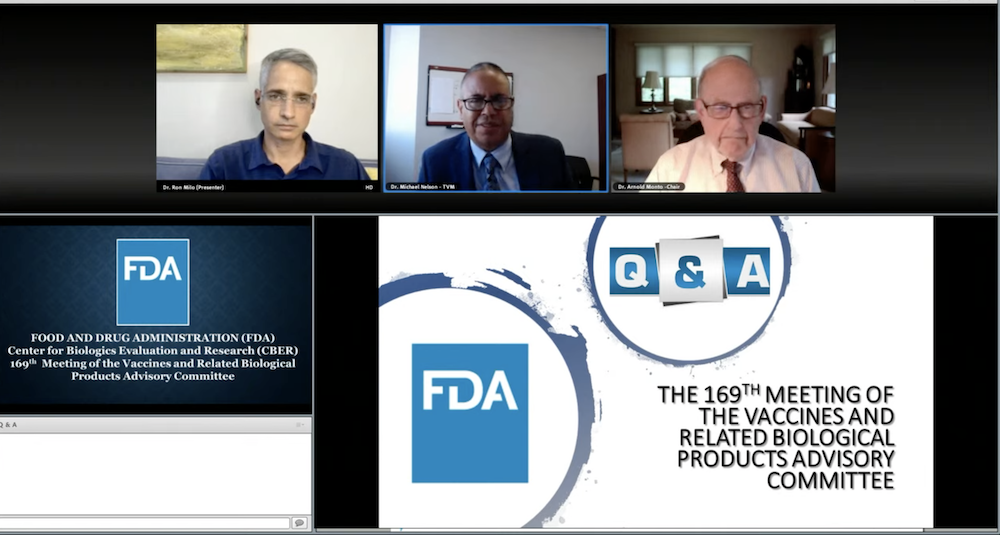WASHINGTON — A Food and Drug Administration’s advisory committee voted unanimously on Thursday to recommend that the FDA approve the booster shot of Moderna’s COVID-19 vaccine for people age 65 and older and those with underlying medical conditions or who are at higher risk of exposure to the virus.
The Vaccines and Related Biological Products Advisory Committee’s recommendation now goes to the FDA for approval. If approved, the Centers for Disease Control and Prevention then would review it and make a final decision in the next couple of weeks.
Several members of the advisory committee cautioned that there was insufficient data and a lack of diversity in the people chosen by Moderna’s for the clinical trials.
Only 149 subjects were involved in the trial, and 95.3% of them are white and 60.4% of them are women, according to the FDA.
Patrick Moore, American Cancer Society professor at University of Pittsburgh, pointed out the issue but nonetheless voted yes. He said he went with his gut feeling.
“Data are not perfect. But it’s an extraordinary time and we have to work with imperfect data,” said Dr. Eric Rubin, editor-in-chief of New England Journal of Medicine and a committee member.
On Sept. 3, Moderna requested authorization of its half-dose booster shot to be used at least six months after the two-dose primary series for those 65 and older and those above 18 who have underlying medical conditions or are at higher risk of exposure, including health care workers, teachers and prisoners.
This is the same population group for which Pfizer and BioNTech’s COVID-19 third dose was approved to distribute on Sept. 24.
Moderna’s therapeutic area head, Jacqueline Miller, told the panel that the Moderna’s booster shot leads to a 17-fold increase in antibody level countering the delta variant. Miller also said that the adverse reactions of the booster shot are not more severe than those of the second dose.

Moderna’s clinical trials show an increase in antibody levels after giving booster shots. (Livestream of the FDA meeting)
On Friday, Johnson & Johnson’s booster shot of the COVID-19 vaccine will be reviewed by the same FDA panel. The experts will also discuss “mix-and-match,” using different types of vaccines from different manufacturers.
During Thursday’s meeting, a clear distinction was made between the half-dose (50 mcg) booster shot and the full-dose (100 mcg) third dose of Moderna’s COVID-19 vaccine. The 100 mcg third dose was made available to only the immunocompromised individuals on Aug. 12. Some experts questioned how Moderna plans to prevent confusion during the distribution process.
“We recognize that this will require some education and enforcement and so we are preparing to send a ‘Dear Health Care Provider’ letter explaining how the doses are to be administered,” Miller responded.
Scientists from Israel at the meeting presented that the Pfizer booster shots’ distribution in Israel has led to a decline in COVID cases in the unvaccinated group. They also suggested the side effect of a third dose is lower than the second dose, though there could be underreporting cases.
“For 3.7 million booster doses administered, we had 44 serious adverse events reported,” they said.

Scientists from Israel show that Pfizer booster shots’ distribution has led to a decline in COVID cases in the unvaccinated group in Israel. (Livestream of the FDA meeting)
Earlier this month, the CDC found that the booster shot of the Pfizer vaccine does not cause additional complications compared with the second dose.
New research shows that unvaccinated Americans view the scientists’ haste in developing booster shots as a sign that the vaccines are not working as well as promised, according to the Kaiser Family Foundation. Meanwhile, those vaccinated see it as a sign that scientists are striving to make vaccines more effective.
As of Wednesday, 56.6% of Americans were fully vaccinated, while 34.4% have not yet received one dose of COVID vaccine, according to the CDC.
President Biden on Thursday highlighted progress made in reducing COVID-19 infections since September and encouraged more to get shots.
“These boosters are free, available and convenient to get,” President Biden said. “We have to do more to vaccinate the 66 million unvaccinated people in America. It’s essential.”
Merck on Oct. 8 said it has developed an oral medicine that could reduce the risk of hospitalization or death by approximately 50%. The company has submitted it to the FDA for emergency use authorization. If approved, the pill would become the first oral antiviral medicine for COVID-19.
COVID-19 cases have fallen by over 45% after reaching a peak in September, according to the CDC. Dr. Anthony Fauci, however, warned on Saturday that though there’s a turnaround in the slope, the death count is still up.
“I strongly suspect that you’re going to start seeing the deaths go down similar to the hospitalizations,” he said.
In an interview, Richard Kennedy, professor of medicine at the Mayo Clinic and co-director of the Vaccine Research Clinic, said that the country would likely see a rise in COVID cases as people will tend to stay indoors when winter comes.


